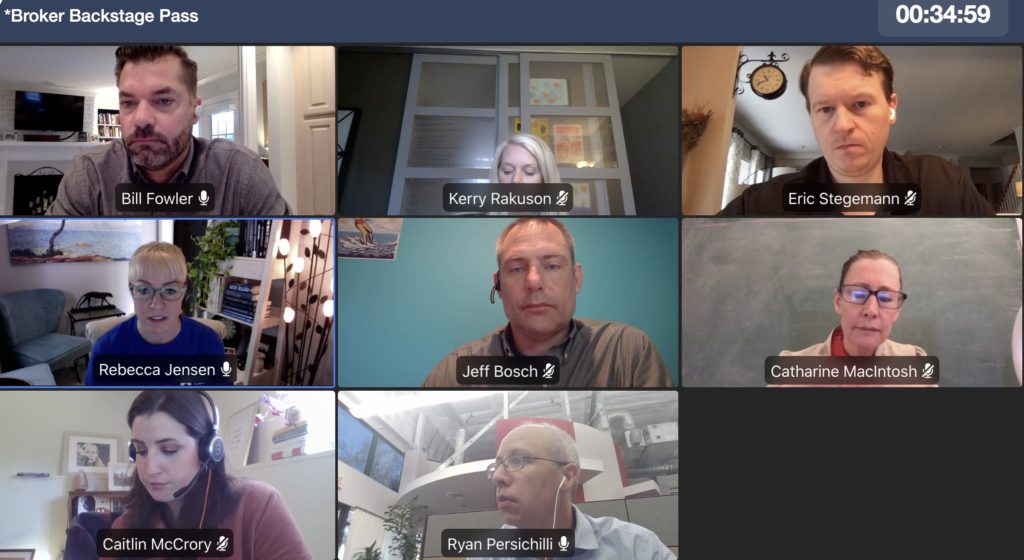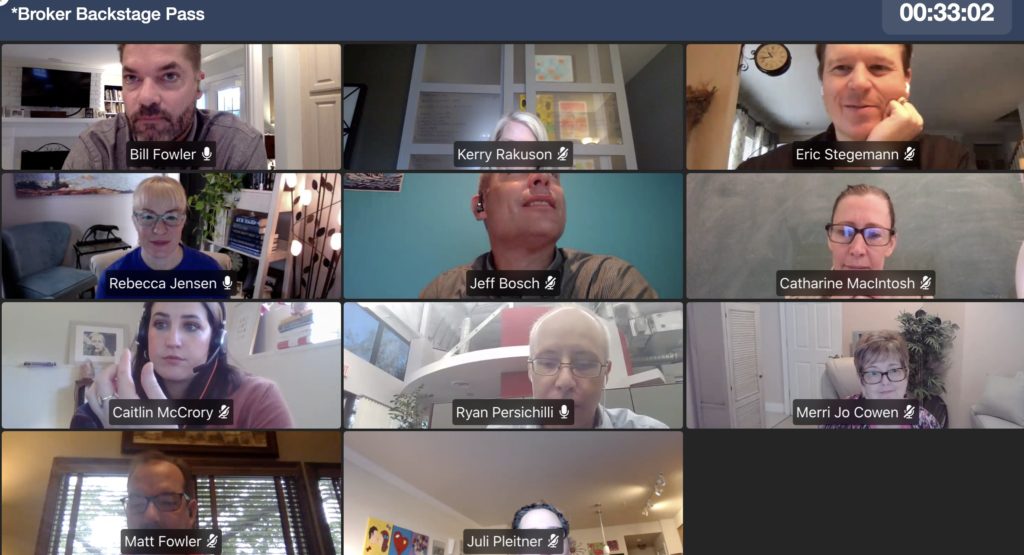The Opening Act The Real Estate Standards Organization (RESO) held its second digital conference last week, RESO Remote Encore: The Standards Collection. With a +20% percent jump in attendance over the previous conference (which had +30% growth over its prior conference), RESO Remote Encore was a smash hit.
The week was as much a celebration as a conference, as the culmination of some major industry initiatives were highlighted. RESO released its entirely rebuilt, automated certification stack. The newly published Working With Real Estate Data course was revealed.
The Data Dictionary and Web API standards specifications that will finally bring the entire industry into one single standard were voted on and approved by the volunteer workgroups. New members in new verticals and international organizations highlighted the speaker list.
Like every RESO conference, there was music, laughter, great speakers and a highly intelligent group of people getting work done in the live workgroup meetings and lively receptions.
Jump to Links
Day 1: Business Track | RESO Today | Standards as an Imperative | Rentals in the MLS | New Verticals, New Countries | Revealing the New Certification Stack | Roundtables
Day 2: Technical Track | What’s in the Buckets | Maxing Out the Web API & What’s Next at CMLS | The Whole Digital House | Standards as a Platform | Using Web API to Deliver More Services
All Workgroup Meetings | Internet Tracking | UPI | Transport | Distributed Ledger | Cross-Platform Interop. | Data Dictionary | R&D | Broker Advisory | Payloads
The Standards Collection
The theme of this conference focused on musical standards. RESO’s workgroup leaders tend to be musicians and rockers at a surprisingly common rate! The Standards Collection theme lent itself to the RESO band’s rendition of Willie Nelson’s “On The Road Again,” the Lost Lyrics reception by realtor.com and the Name That Tune mixer held by Zillow.
There were also special cameo (Cameo) appearances by Alice Cooper and Snoop Dogg to thank the RESO volunteers for their work. You read that correctly. If you weren’t in the room where it happened, you’ll just have to ask those who joined us live.
Along with our musical guests, RESO volunteers were thanked in a video montage by leaders of many influential organizations in the industry, including:
- National Association of REALTORS®
- Zillow Group
- Coldwell Banker
- Compass
- HomeServices of America
- RE/MAX
- Redfin
- Century 21
- eXp Realty
- Windermere
- Better Homes and Gardens
- CMLS
Day 1: Taking Care of Business, Sponsored by DynaConnections
The business track for RESO’s Day 1 opening was highlighted by Rebecca Jensen, RESO Board of Directors Chair and Midwest Real Estate Data (MRED) CEO. Rebecca and RESO CEO Sam DeBord highlighted RESO’s 2020 achievements, some of them 20 years in the making.
 RESO certifications have left the stair-step model of bronze/silver/gold/platinum behind, and all certifications now achieve the same consistent interoperability of one standard. This is a major milestone made possible by the hard work of hundreds of volunteers to bring the standards specification and testing rules into harmony. Our systems are all now speaking the same language.
RESO certifications have left the stair-step model of bronze/silver/gold/platinum behind, and all certifications now achieve the same consistent interoperability of one standard. This is a major milestone made possible by the hard work of hundreds of volunteers to bring the standards specification and testing rules into harmony. Our systems are all now speaking the same language.
As Jensen noted, “When RESO started out, we wanted people to dip a toe in and learn the lingo. This has been years in the making. Now’s the time to go all in. There are no more excuses. The runway is done, it’s time to lift off.”
The session continued by highlighting RESO’s expansion outside of residential MLS data. Rental companies, assessment companies, commercial organizations and international organizations are contributing to expanding data standards in real estate.
 Jensen spoke about the Networked Office and Web (NOW) Policy proposal which was requested by RESO membership to bring efficiency to MLS data access. “The NOW policy is aptly named. It’s no secret that these problems have existed for years. It’s time to get standards and open data access in every market.”
Jensen spoke about the Networked Office and Web (NOW) Policy proposal which was requested by RESO membership to bring efficiency to MLS data access. “The NOW policy is aptly named. It’s no secret that these problems have existed for years. It’s time to get standards and open data access in every market.”
DeBord and Jensen closed by noting that the time has come to transition fully from the industry’s outdated RETS data transport and fully embrace the Web API. “We’re seeing MLS after MLS shelve RETS,” said Jensen. “It’s no longer an acceptable way to handle data. Vendors and brokers say the RESO Web API makes great business sense.”
Standards as an Imperative: RESO Leadership in Action
Stefan Swanepoel, the Chairman and CEO of T3 Sixty, led a conversation on leadership with Colette Stevenson, CEO of Hilton Head Island MLS. Colette’s organization takes the unique position that even though it isn’t a RESO requirement, all of their data partners must either:
- become RESO certified
- be a RESO member
- attend RESO conferences
 The session continued the “no more excuses” theme. “We hear so often, ‘You don’t understand my market,’” said Swanepoel. “From a consumer view, they don’t really care if there are 550 MLSs. They just want good data. They’re tired of excuses.”
The session continued the “no more excuses” theme. “We hear so often, ‘You don’t understand my market,’” said Swanepoel. “From a consumer view, they don’t really care if there are 550 MLSs. They just want good data. They’re tired of excuses.”
Stevenson concurred: “What we all do as MLSs isn’t so different. Our local variations are just additions to the standard. Full RESO adoption is way overdue. Not creating this efficiency is not having empathy for those you serve. We’re not here to restrict anything. We’re here to enhance technology.”
“Think outrageously,” implored Stevenson to industry leaders. “What would be the most outrageous thing your organization could do that would make customers happy? Then ask yourself, is that really outrageous?”
Harkening back to RESO’s beginnings 20 years ago, Swanepoel reminded the audience of the work still to be done. “We should be grateful to the National Association of REALTORS® for creating RESO. We need to fully embrace it. We’ve been dragging our feet as an industry for too long. This progress is overdue.”
Rentals in the MLS
Rental inventory and data in the MLS is a topic growing in popularity. While MLSs have been heavily focused on for-sale properties over time, there’s a big opportunity being missed according to MRED CTO, Chris Haran, who is also RESO’s Cross-Platform Interoperability Workgroup Chair.
Haran led a panel with Ishay Grinberg, CEO of RentalBeast, and Cameron Paine, VP of Industry Relations for CoStar / Apartments.com, on expanding rental capabilities in MLSs.
 “MLSs are missing a large commission pocket. $12 billion in commissions happen every year in rentals,” said Grinberg. “Millennials and Gen Z are taking the majority of the buy side business and 70% of rental business. The sales market is so hot that agents say they don’t have time for rentals. But inventory is tight, and if your buyer can’t find a place, what do they do? Nine out of ten rent. Build a pipeline.”
“MLSs are missing a large commission pocket. $12 billion in commissions happen every year in rentals,” said Grinberg. “Millennials and Gen Z are taking the majority of the buy side business and 70% of rental business. The sales market is so hot that agents say they don’t have time for rentals. But inventory is tight, and if your buyer can’t find a place, what do they do? Nine out of ten rent. Build a pipeline.”
Paine was also focused on agents and their ability to service customers and build a broader client base. “Diversify your customers’ opportunities,” he said. “If the MLS is supposed to be the critical data link for the brokers, are they really meeting that need if they don’t have rental properties? Allow rental listing upload. Create ease of inventory creation while controlling the quality of input.”
All participants agreed that MLSs need to think about rental properties differently than for-sale properties. The data fields needed are far different.
“Keep the input simple,” said Paine. “A rental isn’t really about the qualities of the property, but a place to live. Siding, roof, etc. might be important to a buyer but the interior spaces are critical to renters.”
Said Grinberg, “The shelf life of a rental is often measured in hours. MLSs don’t operate at that cadence. Keeping that data real-time is key.”
It was estimated that most MLSs have less than 15% of the local rental inventory, and many have none. There is a lot of work to be done in servicing these consumers. As Haran pointed out, “Council of MLS reminds us that, ‘making the market work’ is important, and rentals are a big part of the market.”
New Verticals, New Countries
Anthony Percaccio joined the conference to talk about expanding standards into new areas not traditionally covered by residential MLSs. Percaccio is the Director of Architecture and Information Systems for Revenue Services at the Municipal Property Assessment Corporation (MPAC) located in Ontario. MPAC is North America’s largest property assessment data organization.
 The adoption of RESO standards makes sense to MPAC because of its partners in organized real estate. Between Candian MLSs, REALTOR® boards, brokerages and other data partners, the real estate space in Canada is closer to the U.S. real estate industry than in any other country.
The adoption of RESO standards makes sense to MPAC because of its partners in organized real estate. Between Candian MLSs, REALTOR® boards, brokerages and other data partners, the real estate space in Canada is closer to the U.S. real estate industry than in any other country.
“The Data Dictionary is the real estate industry’s universal language for technology,” said Percaccio. “Using the standards in Canadian organizations allows us to be interoperable with international partners.”
MPAC also sees value in the Universal Property Identifier (UPI). Percaccio has been heavily involved in expanding the UPI’s model to not only work in Canada but to improve property identification confidence. “The RESO UPI is a really good model already, and we’re excited to expand and adopt it in Canada.”
Revealing the New Automated Certification Stack
RESO Chief Architect Josh Darnell took the virtual stage with Sam DeBord to demonstrate RESO’s fully rebuilt certification systems. Thanks to support from FBS, creators of Flexmls, RESO was able to demo a live server test.
 16,000 tests were run in about 10 seconds, and reporting for those tests was displayed. Through a new set of messages and reports, users will be able to easily tell where they need to make changes. Just as importantly, data consumers will be able to see objectively what kind of data will be on an MLS server and make future development decisions with more clarity and certainty because of the reporting created.
16,000 tests were run in about 10 seconds, and reporting for those tests was displayed. Through a new set of messages and reports, users will be able to easily tell where they need to make changes. Just as importantly, data consumers will be able to see objectively what kind of data will be on an MLS server and make future development decisions with more clarity and certainty because of the reporting created.
The details of the certification tools were discussed further in the RESO Transport Workgroup meeting. Anyone who would like to participate in self-testing their systems and prepping for passage of certification should reach out to RESO for access to the tools on RESO’s GitHub repository.
Day 1 Roundtables
RESO’s roundtables are some of the more popular sessions. Set topics attract a wide range of attendees to hash out industry issues. Live discussions are incorporated into later workgroup meetings to ensure RESO is measuring the pulse of the industry.
Day 2: Ready to API, The Technical Track, Sponsored by MLS Grid
RESO’s second day began with a second set of roundtable discussions. The energy in these sessions is always high and sets the tone for the rest of the day.
 Joseph Szurgyi, CEO of MLS Grid, was the first speaker of the day. MLS Grid’s quest for efficiency in data access and management is aligned with RESO’s mission and vision of an efficient, streamlined real estate technology industry.
Joseph Szurgyi, CEO of MLS Grid, was the first speaker of the day. MLS Grid’s quest for efficiency in data access and management is aligned with RESO’s mission and vision of an efficient, streamlined real estate technology industry.
Szurgyi talked about MLS Grid’s decision to be a Web API-only service, focusing on training its customers on the new API instead of supporting RETS. The goal for the service has always been to ensure no data is lost in translation to the Web API.
“The MLS has one very important job, and that’s delivering timely, accurate data,” said Szurgyi. “In 2017, we explored the possibility of supporting both kinds of data transport. The redundancy and cost of maintaining them both is not effective. More importantly, if you maintain RETS, you discourage API adoption.”
 MLS Grid services a dozen MLSs, so Szurgyi shed some light on the current state of the industry’s data, in terms of traditional MLS policy definitions. The average MLS has about 340 fields in their IDX data feeds, not counting local custom fields. They average 376 in VOW and 390 Broker Back Office data sets. These are very small differences in raw numbers, and they’re usually fields that are not displayed to the public, like lockbox codes, showing details and personal information.
MLS Grid services a dozen MLSs, so Szurgyi shed some light on the current state of the industry’s data, in terms of traditional MLS policy definitions. The average MLS has about 340 fields in their IDX data feeds, not counting local custom fields. They average 376 in VOW and 390 Broker Back Office data sets. These are very small differences in raw numbers, and they’re usually fields that are not displayed to the public, like lockbox codes, showing details and personal information.
MLS Grid’s goal is to get all of an MLS’s data into their Web API implementation so they can support any broker’s business needs, including standard and local custom fields. To support new policy measures, like the Participant Data Access Policy and the potential of NOW policy, Szurgyi feels the organization has put itself in a good position to provide those services for MLSs and brokers.
Maxing Out the Web API and What’s Next at CMLS
CMLS CEO Denee Evans and current CMLS Chair Brad Bjelke, who is also the CEO of UtahRealEstate.com, talked about what’s next in data for the MLS space. In particular, they highlighted Bjelke’s organization’s efforts to move all of its customers to the Web API.
 UtahRealEstate.com is likely the first organization in the industry to set a cutoff date for RETS. By January 2021, all of its data consumers will be on the RESO Web API service.
UtahRealEstate.com is likely the first organization in the industry to set a cutoff date for RETS. By January 2021, all of its data consumers will be on the RESO Web API service.
Said Bjelke, “Where there’s a will there’s a way. The way’s been there for a while. It’s now just the will. We’ll convert everyone to Web API, and those vendors will be able to do this with all of their other MLSs.”
This leadership position carried throughout the conversation. Said Evans, “Converting from RETS to Web API is a little bit of extra work, but we have to do it. Consumers demand it.”
Said Bjelke, “You can still build a 5.25-inch floppy disk, and it can work, but we use USB-C now. It’s time to move forward.”
The Whole Digital House
New, rich media keeps expanding what consumers are able to view online about properties. With 2020’s remote work and changing real estate landscape, Caitlin McCrory, Head of Industry Relations at Redfin, and Troy Davisson, Director of Data Engineering at FBS, led a lively discussion on getting more multimedia content into MLS listings in a standard way.
 McCrory noted that virtual tours of homes have remained up 8–10% at Redfin this year, even after strict social distancing and property showing rules had been lifted. Davisson agreed that they were seeing strong changes in consumer behavior pointing to more recorded and live remote showings.
McCrory noted that virtual tours of homes have remained up 8–10% at Redfin this year, even after strict social distancing and property showing rules had been lifted. Davisson agreed that they were seeing strong changes in consumer behavior pointing to more recorded and live remote showings.
“MLS software vendors like Flexmls are using URL checking for detection of prerecorded tours versus livestream open houses,” said Davisson. “Initially, 99% of URLs submitted for livestream open houses were prerecorded prior. That’s not the intent. But as we’ve cleaned that up, it’s clear the live showings will continue to grow.”
McCrory asked about the consumer experience downstream from the MLS on broker and agent websites. “How do we not just ingest rich media into the MLS but also allow it to be disseminated to IDX websites, etc. in a standardized way?“
Both speakers agreed that getting rich media experiences done in a standard way so the processes match across marketplaces is critical. They emphasized getting involved in RESO’s Broker Advisory Workgroup and Data Dictionary Workgroup to push these standards forward.
Standards as a Platform
Al McElmon, Senior Leader of Software Engineering, and Dan Ray, Technical Product Manager, both from CoreLogic, spoke about making standards the core of development philosophy. John Breault, Vice President, MLS & Member Services at Rhode Island Association of REALTORS® & State-Wide MLS and Vice-Chair of RESO’s Research & Development Workgroup, moderated the discussion.
 “Our Data Dictionary pipeline has become the data platform that our entire product suite exists on. We can get to market now with a nimbleness and speed that we’ve never been able to do before,” said Ray. “This is one of those times enterprise initiatives actually pan out. Efficiency is efficiency.”
“Our Data Dictionary pipeline has become the data platform that our entire product suite exists on. We can get to market now with a nimbleness and speed that we’ve never been able to do before,” said Ray. “This is one of those times enterprise initiatives actually pan out. Efficiency is efficiency.”
“What problems have you been able to solve by using the RESO Data Dictionary as your platform for other services like Trestle?” asked Breault.
“Most of them,” McElmon bluntly replied.
Ray and McElmon went on to explain that all of their future development for products like Matrix, Trestle and OneHome begins with the standardized data pipeline that they’ve built, and everything else becomes easier through its usage.
Using Web API to Deliver More Services: Economic Data Update
Many of the sessions at RESO Remote Encore focused on the Web API as a platform. Companies are delivering microservices on top of it for statistics, reports and tax data.
 Zillow Group’s Senior Economist, Jeff Tucker, talked about some of the data Zillow uses in forecasting market trends. The snapshot of the market provided the RESO audience a new perspective on the fast-changing 2020 real estate scene. Of particular interest from Tucker:
Zillow Group’s Senior Economist, Jeff Tucker, talked about some of the data Zillow uses in forecasting market trends. The snapshot of the market provided the RESO audience a new perspective on the fast-changing 2020 real estate scene. Of particular interest from Tucker:
“Record low inventory of homes for sale is energizing price rebounds. Homes are selling faster this year than last year.”
“Is everyone leaving cities for suburbs? Not yet (except San Francisco).”
“What’s buoying demand? Forty-six million millennials in first home-buying demographic versus 41 million previously.”
Tucker’s session brought a lot of interest from the attendees and a new angle on a RESO conference session.
Pain Points Session
RESO’s Pain Points sessions during conferences were introduced in 2019 and have become possibly the most popular meetings. They’re intended to be loosely structured, with a few moderators offering topics and collecting feedback while letting membership drive the direction of the conversation.
 RESO’s Working With Real Estate Data course and NOW Policy proposal are both results of RESO Pain Points sessions.
RESO’s Working With Real Estate Data course and NOW Policy proposal are both results of RESO Pain Points sessions.
The moderators were Jessica Edgerton, Executive Vice President of Operations and General Counsel for Leading RE, and Jon Coile, Vice President – MLS & Industry Relations for HomeServices of America and Chair of Bright MLS.
Jessica and Jon began by discussing the concept of one feed with all the data a broker needs. There is an industry desire to start building the infrastructure of the future while throwing off traditional policy constraints that needlessly slow brokers and MLSs from achieving business goals.
As the NOW Policy is still not well understood by those who haven’t delved into the details of the policy proposal, there were some expected concerns about MLSs acquiescing to their roles in data quality and access compliance.
The group reiterated the goals for the policy. A NOW data policy would be:
- for MLS participant brokers
- data that participants already have access to through other methods
- keeping the best parts of current policy to ensure safeguards and compliance
- removing unnecessarily cumbersome policy
- simplified rules and processes for MLSs and brokers
- combined display, distribution, valuation and derivative works policy that makes compliance easier through clearer communication
- NOT a display of confidential data
- NOT an unfettered usage or unlimited derivative works
- NOT permission for nonparticipants to expand their data access/usage
It was pointed out that the pain doesn’t necessarily come from the technology, but rather the process that leads up to it. In some cases, an MLS requires two or three separate technology vendors for a single broker to access all of its data.
With NAR representatives joining the conversation, compliance with current and future policies was a hot topic. Most noncompliance comes from a lack of understanding. A quick call from RESO or NAR can usually remedy these situations.
A term that’s been used in the past, “TSA Precheck,” describes part of another RESO initiative but is a problematic label. RESO will not create an endorsed list of vendors, nor will it create a list of problematic or unendorsed vendors. The Experience Record initiative is a neutral record of facts about organizations that have working data relationships. These organizations mutually volunteer this information to RESO, then the aggregated relationship data can be published for data consumers to review and guide their decisions as they see fit.
Broad support was voiced for the Working With Real Estate Data course. Many organizations asked to be included in the pilot of the course and would recommend that their staff take the course.
The session covered a wide range of other topics, including the following items:
- Improving roster data standards, implementations and validation
- Cooperation and compensation rules extending past an MLS marketplace and across a state where a member is licensed
- The continued improvement of consistency in Web API implementations across the industry’s technology vendors
- The benefit of local custom fields existing side by side with RESO standards fields in MLS Web API services
Pain Points sessions never disappoint. While members may feel they’re complaining, this is the content that RESO staff thrives on. Cry on our shoulder. Tell us how we can help. It’s why we’re here.
RESO’s Workgroup Updates
RESO holds live workgroup sessions during conferences. These workgroups meet throughout the year to continue developing open standards to streamline technology. During the conference, these groups recap the progress and successes they’ve seen throughout the year, make key votes on RESO policy and invite new members into the workgroups.
Internet Tracking
The Internet Tracking Workgroup develops standards that create consistent activity reporting across different technology platforms. The group focused its meeting on their Summary Fields paper. This paper serves as an introduction to the fields approved for Data Dictionary 1.8 (initial Internet Tracking fields were approved in Data Dictionary 1.6).
The new fields are one-to-one tracking totals and not the record-by-record tracking data published in Data Dictionary 1.7. The summary fields are the sum of specific tracking events over a period of time (listings viewed, shared, etc.). General belief within the group is that this will be the tracking model best consumed at the industry level.
Universal Property Identifier (UPI)
The UPI Workgroup delved further into its model to accurately identify subproperty items. Rather than simply identifying properties by their parcel-level characteristics, items at the subproperty level were studied by RESO member organization, Cherre, and the group continued to discuss standardizing around the way these items are designated.
The UPI’s international growth was also highlighted. The Foundation for International Blockchain and Real Estate Expertise (FIBREE) has adopted the concept for some property identification implementations in Europe. During this meeting, MPAC’s Anthony Percaccio presented the model for how the UPI could expand across Canadian data sets.
The group is exploring a technical implementation to record facts against a registry of UPIs, potentially built and housed by RESO.
Transport
The Transport Workgroup is primarily focused on the RESO Web API specification at the moment. Some significant specification documentation was approved at this meeting.
Web API Core 1.0.2 is the standard going forward for Transport, combining all of the past testing for bronze/silver/gold/platinum tests into one cohesive core standard. The group also adopted the RESO Data Dictionary 1.7 testing specification to bring Transport and Data Dictionary standards into harmony and to ensure that Data Dictionary certification on the Web API is consistent.
The group will likely vote on a final Payloads Specification at its next meeting.
Distributed Ledger
The Distributed Ledger Workgroup has built out an event cataloging model over time to serve the industry. This group’s model is now helping to support a RESO Standard Event Model.
The workgroup is working on a registry model that could be applied to both the UPI and Unique Licensee Identifier (ULI). They are also supporting ULI with workflow diagrams.
Cross-Platform Interoperability
The Cross-Platform Interoperability Workgroup discussed how to adopt a RESO Standard Event Model for transaction management event tracking. The group has created data flow diagrams and discussed use cases and event flow.
Transaction management resources, with particular attention given to DocuSign and DotLoop, were covered. The group is working toward including transaction management in the Data Dictionary.
Data Dictionary
 The Data Dictionary Workgroup highlighted its updates to standard field/enumeration names and display names. Adjustments have been made to adhere more to OData specifications required for Web API transport.
The Data Dictionary Workgroup highlighted its updates to standard field/enumeration names and display names. Adjustments have been made to adhere more to OData specifications required for Web API transport.
Adding accuracy to agent and broker records is a hot topic in the industry, and the approval of additional fields to support this effort came in the form of the MemberStateLicenses collection. This effort dovetails with the ULI efforts of the Research & Development Workgroup. Companies with agent roster data should be able to collect multiple state licenses from a single person and uniquely identify that person in their data records.
The Tax Subgroup has gained momentum and will provide quality extensions to the Data Dictionary and eventually Payloads. There are also subgroups forming for Authorization Information for Data Consumers, which would provide technology vendors with updated information about whether data partner access rights have changed, and for Caravan/Open House Tours.
Research & Development
The Research & Development Workgroup is heavily focused on the ULI initiative mentioned earlier. This model would add accuracy to data sets and help deduplicate rosters. There is currently a multi-MLS data pilot underway.
The group is discussing matching algorithms for identifying licensees. Flow charts and workflow outlines are in the works.
 Broker Advisory
Broker Advisory
The Broker Advisory Workgroup covered the Working with Real Estate Data course content draft. The initial Business Concepts Module is active for pilot participants, and many meeting attendees signed up.
The group also discussed the draft of the Networked Office and Web (NOW) MLS Policy and Model. This policy came from RESO broker and MLS members advocating for a need to streamline and create efficiency in data access and management.
The upcoming Broker Advisory Workgroup Facebook Group was introduced as an easier way for brokers to collaborate and highlight new issues where RESO can focus its efforts.
Payloads
The role of the Payloads Workgroup has been shifted to allow for more payloads coverage in a shorter amount of time. The group will continue to define a set list of fields that will be identified as the components of a RESO payload. Additional information about the value of certain fields may be attached to this list.
Decisions related to certain fields being included in certified systems will be left to the Certification Subgroup contained within the Transport Workgroup. Reporting on payloads endorsements will be published with details on data availability. Transport will review the Payloads Specification again at its next meeting for a vote.
With more than 100 people incredibly still weighing in on the nuances of data payloads in the last hour of RESO Remote Encore after three packed days of virtual conferencing, we bid adieu until next time, hopefully in person but ready to rock your living rooms, kitchen counters and office nooks with more hype, fun, themes and, above all else, the important work that members do to improve the real estate industry.







